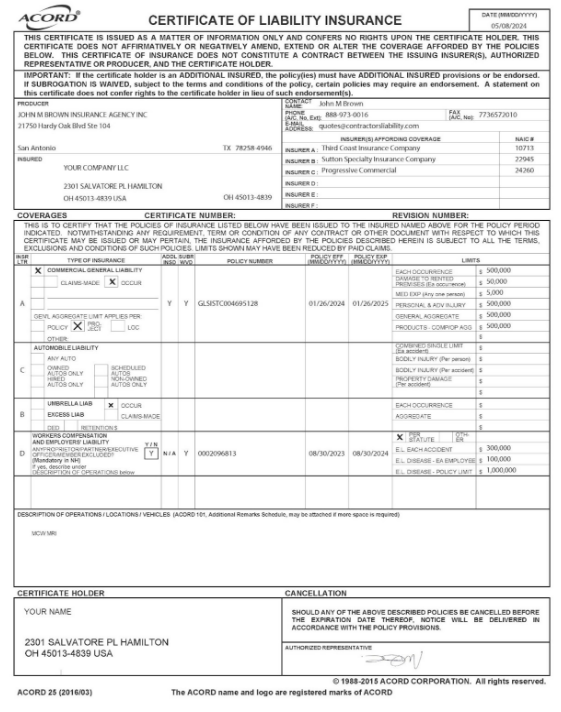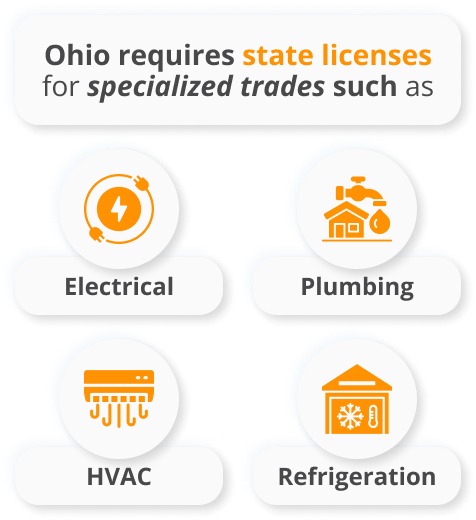Unlocking Success in Ohio’s Construction Industry: A Contractor’s Guide to Licensing and Compliance. Get your General Contractor Licensing in Ohio.
Embarking on a career as a general contractor in Ohio opens up a world of opportunities, but it also requires a clear understanding of the state’s unique regulatory landscape. This section provides an insightful overview of what it means to be a general contractor in Ohio, highlighting the scenarios in which a state license is necessary and when it is not. Get your General Contractor Licensing in Ohio.
For information on contractor licenses in Ohio, you can refer to the Ohio Construction Industry Licensing Board (OCILB).
Contact Information:
Web: Ohio Construction Industry Licensing Board (OCILB)
Alternate Phone Number: 512-463-6599 (For calls outside Texas)
Alternate Phone Number: 512-463-6599 (For calls outside Texas)
Phone: 1-877-644-6364
Alternate Phone Number: 512-463-6599 (For calls outside Texas)
Alternate Phone Number: 512-463-6599 (For calls outside Texas)
Address:
Main Office: 6606 Tussing Road, Reynoldsburg, OH 43068
The OCILB website provides comprehensive information on licensing requirements, application forms, exam details, and guidelines for maintaining compliance.

Navigating the Ohio Landscape
Ohio presents a diverse and dynamic environment for general contractors, with many projects ranging from residential renovations to large commercial developments. The state’s vibrant construction industry significantly contributes to the local economy, making it an attractive option for contractors looking to establish or expand their business.

Understanding Licensing Requirements
Ohio presents a diverse and dynamic environment for general contractors, with many projects ranging from residential renovations to large commercial developments. The state’s vibrant construction industry significantly contributes to the local economy, making it an attractive option for contractors looking to establish or expand their business.

Statewide Licensing for Specialized Trades
However, contractors must recognize that certain specialized trades do require a statewide license, irrespective of the project’s cost. This includes trades such as electrical, plumbing, HVAC, and refrigeration.The Ohio Construction Industry Licensing Board (OCILB) is the authority responsible for issuing these licenses, ensuring that contractors meet the necessary standards of expertise and safety.

Local Licensing and Registration
For general contractors not specializing in the aforementioned trades and whose projects exceed the $1,000 threshold, pursuing a general license at the local level becomes a viable option. Local municipalities across Ohio have their specific requirements and processes for licensing, and contractors are encouraged to engage with local authorities to ensure compliance.

Setting the Stage for Success
By understanding the unique aspects of Ohio’s licensing landscape, general contractors can navigate the regulatory environment with confidence. Whether you are a seasoned professional or new to the industry, this knowledge is crucial in setting the stage for a successful and compliant contracting career in Ohio.
Statewide Licensing for Specialized Trades and General Contractors in Ohio
In Ohio, while general contractors can often operate without a state license for smaller projects, professionals in specialized trades such as electrical, plumbing, HVAC, and refrigeration are required to obtain statewide licensing. This section delves into the specific licensing requirements for these trades and explains the pivotal role of the Ohio Construction Industry Licensing Board (OCILB).
Electrical Contractors:
- To work as an electrical contractor in Ohio, professionals must obtain a license from the OCILB.
- Applicants are required to have a minimum of five years of experience in the trade or equivalent education and experience.
- Passing a comprehensive exam that covers electrical codes, theory, and practical knowledge is mandatory.
Plumbing Contractors:
- Plumbing professionals are also required to be licensed by the OCILB.
- Similar to electrical contractors, plumbers need to demonstrate five years of experience or a combination of education and experience.
- A passing score on a state-administered exam is required, covering topics such as plumbing codes, installations, and safety practices.
HVAC Contractors:
- HVAC contractors in Ohio must hold a valid license issued by the OCILB.
- The licensing process includes proving a minimum of five years of experience in heating, ventilation, air conditioning, or refrigeration work.
- Applicants must successfully pass an exam that tests their knowledge of HVAC systems, codes, and safety standards.
Refrigeration Contractors:
- Refrigeration contractors are also under the jurisdiction of the OCILB and are required to be licensed to operate in Ohio.
- The licensing criteria include a minimum of five years of experience in the refrigeration trade.
- A state-administered exam, covering refrigeration systems, codes, and safety practices, must be passed to obtain the license.
Role of the Ohio Construction Industry Licensing Board:
- The OCILB plays a crucial role in maintaining high standards within the construction industry in Ohio.
- It is responsible for administering exams, issuing licenses, and ensuring that contractors in specialized trades adhere to state regulations and industry best practices.
- The board also handles license renewals, continuing education requirements, and any disciplinary actions that may be necessary.
Maintaining Your Registration:
- By requiring statewide licensing for specialized trades, Ohio ensures that contractors have the necessary knowledge, experience, and skills to perform their work safely and effectively.
- The OCILB’s rigorous licensing process helps maintain public safety, protect property, and uphold the integrity of the construction industry in Ohio.
Eligibility Criteria for Statewide General Contractor Licensing in Ohio
Securing a statewide license in Ohio’s specialized trades requires meeting stringent eligibility criteria, ensuring that only qualified professionals enter the field. This section outlines these key requirements and underscores their importance in the application process. Get your General Contractor Licensing in Ohio.

Age and Citizenship
Applicants must be at least 18 years old and provide proof of U.S. citizenship or legal residency, ensuring maturity and legal eligibility to work.

Experience and Background
- A minimum of five years of trade experience, or an equivalent combination of education and experience, is required, showcasing the applicant’s expertise.
- A clean criminal record is mandatory maintaining the industry’s integrity and public trust.

Significance of Criteria
Adhering to these criteria is crucial, as they uphold industry standards and ensure the safety and quality of work in Ohio’s construction sector.

Step-by-Step Application Guide:
- Eligibility Verification: Confirm you meet all criteria including age, citizenship, experience, and have a clean criminal record.
- Document Preparation: Gather required proofs of citizenship, experience or education, and any certifications.
- Insurance Validation: Ensure you have a minimum of $500,000 in contractor liability insurance and prepare to provide proof.
- Application Form: Fill out the Ohio statewide general contractor license application form accurately.
- Fee Payment: Pay the necessary application fee, verifying the current amount and using accepted payment methods.
- Submission: Send your completed application and documents to the OCILB or appropriate licensing authority.
- Await Approval: Wait for your application to be processed and reviewed, which may take several weeks, and respond to any additional information requests if needed.
Associated Costs:
The application fee for an Ohio contractor license is $350 for individuals and businesses. This fee is non-refundable, even if your application is denied.
In addition to the application fee, you will also need to pay for a surety bond and liability insurance. The cost of these will vary depending on your specific circumstances.

Here is a summary of the costs associated with getting an Ohio contractor license:
- Application fee: $350
- Surety bond: $25,000
- Liability insurance: $300,000 / $500,000
Insurance and Financial Requirements for General Contractor Licensing in Ohio
In Ohio, contractors must meet certain insurance and financial requirements to operate legally and protect their businesses and clients. Here’s a comprehensive guide on the insurance and financial requirements for contractors in Ohio:
Contractor Liability Insurance:
- Minimum Coverage: Contractors are required to have a minimum of $500,000 in contractor liability insurance. This insurance covers third-party injuries, property damage, and legal costs associated with claims of negligence.
- Proof of Insurance: Contractors must be able to provide proof of insurance when applying for licenses or permits, and they may be required to show it to clients upon request.
Workers’ Compensation Insurance:
- Mandatory for Employers: If you have employees, Ohio law requires you to carry workers’ compensation insurance. This insurance provides benefits to employees who are injured or become ill as a result of their job.
- Self-Insurance Options: Larger companies with significant financial resources may qualify to self-insure for workers’ compensation.
Some municipalities in Ohio have additional insurance and financial requirements for contractors. For example, the city of Cincinnati requires contractors to have workers’ compensation insurance with a minimum coverage of $100,000 per person and $300,000 per occurrence.


Surety Bonds:
- In Ohio, contractors are required to secure a surety bond as a part of their licensing and registration process, providing an additional layer of protection for their clients and ensuring the integrity of their work. This section delves into the specifics of the surety bond requirements, highlighting the minimum amounts and the factors that could influence the required bond amount.
Minimum Surety Bond Requirement:
- Ohio mandates a baseline surety bond amount of $25,000 for contractors operating within the state. This requirement is in place to safeguard the interests of clients and the public, ensuring that contractors fulfill their obligations and adhere to industry standards.
- Factors Influencing Bond Amount:
- While $25,000 serves as the minimum, it is crucial for contractors to understand that the required bond amount may vary based on several factors:
- Type of Work: The nature and complexity of the projects undertaken can influence the bond amount. High-risk or high-value projects may necessitate a higher bond amount to cover potential liabilities adequately.
- Contractor’s Experience: A contractor’s level of experience and track record in the industry can also play a role in determining the bond amount. Those with extensive experience and a history of successful project completion may qualify for lower bond amounts, while newer contractors or those with less experience may be required to secure a higher bond.
Additional Insurance Options:
- Umbrella Insurance: Contractors may consider purchasing umbrella insurance for additional liability coverage beyond the limits of their standard policies.
- Tools and Equipment Insurance: This insurance covers the theft, loss, or damage of tools and equipment.
| Insurance Type | Coverage | Typical Coverage Limits | Estimated Annual/Cost |
|---|---|---|---|
| General Liability Insurance | Property damage, bodily injury, personal injury | $500K – $1M per occurrence | $700 – $2,5K |
| Workers’ Compensation Insurance | Employee medical expenses, lost wages | Varies by payroll and risk | $2K – $7.5K |
| Commercial Auto Insurance | Business vehicle liability, damage | Varies by vehicle type and use | $1K – $3.5K per vehicle |
| Professional Liability Insurance | Negligence, errors, omissions | Varies by services and limits | $800 – $3.5K |
| Surety Bonds | Contractual obligations | $10K – $50K bond amount | 1% – 5% of bond ($100 – $2.5K) |
| Disability Benefits | Off-the-job wage replacement | Varies by employee | $100 – $500 per employee |
Frequently Asked Questions (FAQ)
These are common questions about General Contractor License in Ohio.
No, general contractors do not need a state license for small projects under $1,000. However, licenses are required for electrical, plumbing, HVAC, and refrigeration trades.
Contractors in specialized trades are required to have a minimum of $500,000 in contractor liability insurance.
Ensure you meet all eligibility criteria, gather necessary documents, prove your insurance, complete the application form, pay the fee, submit your application, and wait for approval.
The application fee is $25, but it’s important to verify the current amount before making a payment.
Electrical, plumbing, HVAC, and refrigeration contractors need a license issued by the Ohio Construction Industry Licensing Board.


